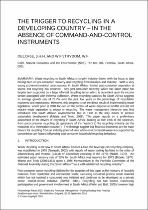 ResearchSpace
ResearchSpace
Trigger to recycling in a developing country: in the absence of command-and-control instruments
JavaScript is disabled for your browser. Some features of this site may not work without it.
- ResearchSpace
- →
- Research Publications/Outputs
- →
- Conference Publications
- →
- View Item
| dc.contributor.author |
Oelofse, Suzanna HH

|
|
| dc.contributor.author |
Strydom, WF

|
|
| dc.date.accessioned | 2010-12-22T08:19:19Z | |
| dc.date.available | 2010-12-22T08:19:19Z | |
| dc.date.issued | 2010-09 | |
| dc.identifier.citation | Oelofse, S.H.H. and Strydom, W.F. 2010. Trigger to recycling in a developing country: in the absence of command-and-control instruments. Waste 2010: Waste and Resource Management: Putting Strategy into Practice, Stratford-upon-Avon, Warwickshire, England, 28-29 September 2010, pp 355-364 | en |
| dc.identifier.uri | http://hdl.handle.net/10204/4702 | |
| dc.description | Waste 2010: Waste and Resource Management: Putting Strategy into Practice, Stratford-upon-Avon, Warwickshire, England, 28-29 September 2010 | en |
| dc.description.abstract | Waste recycling in South Africa is largely industry driven with the focus to date having been on pre-consumer recovery and recycling from business and industry. With a very young pro-environmental consciousness in South Africa, limited post-consumer separation at source and recycling has occurred. Any post-consumer recovery which has taken place has largely been supported by a large informal recycling sector which is dependent upon the income stream associated with informal collection. Waste recycling statistics for South Africa suggests an average growth rate of 23.7% over the past few years in the percentage of recyclables recovered and reprocessed. However, this progress is not the direct result of implementing waste legislation, which prior to 2008 focused on the control of waste disposal at landfill and did not require waste separation at source or recycling. The waste management hierarchy was first introduced into South African environmental law in 1998 as the only means to achieve sustainable development (Matete and Trois, 2008). This paper reports on a preliminary assessment of the drivers of recycling in South Africa, looking at both ends of the spectrum, from post-consumer recycling (as generators of the ‘waste’) to the recycling industry (as the recipients of a ‘renewable resource’). The findings suggest that financial incentives are the main drivers for recycling from an industry point of view while environmental awareness supported by convenience are factors influencing post-consumer household recycling behaviour. | en |
| dc.language.iso | en | en |
| dc.relation.ispartofseries | Conference Paper | en |
| dc.subject | Waste recycling | en |
| dc.subject | Waste legislation | en |
| dc.subject | Recycling | en |
| dc.subject | Waste 2010 | en |
| dc.title | Trigger to recycling in a developing country: in the absence of command-and-control instruments | en |
| dc.type | Conference Presentation | en |
| dc.identifier.apacitation | Oelofse, S. H., & Strydom, W. (2010). Trigger to recycling in a developing country: in the absence of command-and-control instruments. http://hdl.handle.net/10204/4702 | en_ZA |
| dc.identifier.chicagocitation | Oelofse, Suzanna HH, and WF Strydom. "Trigger to recycling in a developing country: in the absence of command-and-control instruments." (2010): http://hdl.handle.net/10204/4702 | en_ZA |
| dc.identifier.vancouvercitation | Oelofse SH, Strydom W, Trigger to recycling in a developing country: in the absence of command-and-control instruments; 2010. http://hdl.handle.net/10204/4702 . | en_ZA |
| dc.identifier.ris | TY - Conference Presentation AU - Oelofse, Suzanna HH AU - Strydom, WF AB - Waste recycling in South Africa is largely industry driven with the focus to date having been on pre-consumer recovery and recycling from business and industry. With a very young pro-environmental consciousness in South Africa, limited post-consumer separation at source and recycling has occurred. Any post-consumer recovery which has taken place has largely been supported by a large informal recycling sector which is dependent upon the income stream associated with informal collection. Waste recycling statistics for South Africa suggests an average growth rate of 23.7% over the past few years in the percentage of recyclables recovered and reprocessed. However, this progress is not the direct result of implementing waste legislation, which prior to 2008 focused on the control of waste disposal at landfill and did not require waste separation at source or recycling. The waste management hierarchy was first introduced into South African environmental law in 1998 as the only means to achieve sustainable development (Matete and Trois, 2008). This paper reports on a preliminary assessment of the drivers of recycling in South Africa, looking at both ends of the spectrum, from post-consumer recycling (as generators of the ‘waste’) to the recycling industry (as the recipients of a ‘renewable resource’). The findings suggest that financial incentives are the main drivers for recycling from an industry point of view while environmental awareness supported by convenience are factors influencing post-consumer household recycling behaviour. DA - 2010-09 DB - ResearchSpace DP - CSIR KW - Waste recycling KW - Waste legislation KW - Recycling KW - Waste 2010 LK - https://researchspace.csir.co.za PY - 2010 T1 - Trigger to recycling in a developing country: in the absence of command-and-control instruments TI - Trigger to recycling in a developing country: in the absence of command-and-control instruments UR - http://hdl.handle.net/10204/4702 ER - | en_ZA |





